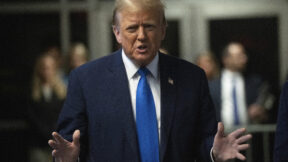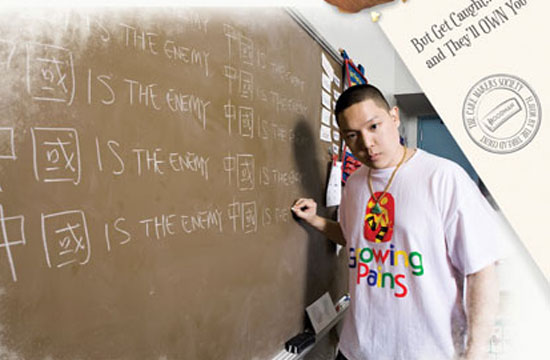Interview With Eddie Huang, Part 3: Let’s Burn Uncle Tam’s Cabin To The Ground
In the past few weeks, we’ve talked with Eddie Huang about everything from geopolitics to anal sex, but with his memoir Fresh Off The Boat dropping next week, we were burning with questions about the motivations behind the book. Frankly, there has never, ever been a book written by an Asian-American quite like this one. But first, we discuss what “Asian” means, and not in a bullshit “academic discussions on the Asian-American Identity” way.
The Braiser: The other day we had some Twitter exchanges about how you were misinterpreted during a Wall Street Journal interview [where he stated that he didn’t understand Danny Bowien’s food at Mission Chinese], and this hasn’t been the first time you’ve reached out and stated, “Yo, I was misinterpreted.” Why do you think this happens to you often?
Eddie Huang: I don’t think I’m actually misinterpreted by writers much. But this particular guy, if you look at the article he wrote — and I can say this, too, I write articles and do interviews — there was like no organization to that thing. As a writer, you have to edit. But what was the piece about? He asked me twenty minutes of questions about Danny, and then pulled quotes out of different parts, out of context, to form a paragraph that actually didn’t go with the rest of his story. Either way, no one is interested in reading the article…The funniest headline was on Grub Street, where they said “Eddie Doesn’t Make Friends.” I was literally with Danny at Mission Chinese last night. He’s my friend.
Danny is the one person in the food world who tested my idea that “it’s not about what’s on the plate, it’s about everything else.” And that’s NOT a backhanded compliment about his food. Everybody knows the type of food I like. I go to Chinese restaurants, I eat at Chinese restaurants, with Chinese chefs, and I like the shit I eat at my mom’s house. Just like every Chinese girl on Yelp who wants the same shit. You know?
The reviewer I always related to was [NY Times reviewer Sam] Sifton. Sifton was always very much about the room, very much about the music playing, and all that. And it was less about food. And I agree. The food needs to be good, but it needs to be more about the cultural experience. But Danny’s food, to me — it’s jarring to me. It says “mapo tofu.” It says “salt cod fried rice.” I expect one thing, and every time I go, I get another.
As a human being, you could use your intellect to get over your preconditions, your precepts, of what you expect that to be. Now, I think the much easier thing was for Americans, irregardless of how you felt, to go enjoy Mission Chinese. I had to get over myself to go enjoy that restaurant. That’s what I was talking about. I thank Danny, and I think that he’s one of the most important chefs today. I mean it. As a Chinese diner and a customer, he’s forcing you to consider what it means to cook Chinese food… Does that make sense?
Yeah, the question you’d ask yourself would be: “Do you feel disloyal for liking something that’s technically a bastardization of what you’re used to?”
Right, and here’s the thing: I think that interview I did on Gilt Taste was one of the best moments when I clearly articulated the ideas of why I didn’t like chefs going to, like, study abroad or taking the year away, bringing back Asian flavors, and then bringing them back to American flavors. I hate that shit. But Danny and Andy Ricker are two that I really, really admire. Andy goes [to Thailand], and he practices, and he tries to nail it down as close as possible to like what he had. I think it’s beautiful. And he gives a lot of credit to the people he learned from. On the other hand, Danny is trying to achieve flavors that are traditional, but he’s achieving them without the traditional Chinese techniques. He’s using his own techniques to try and achieve these flavors.
Can I say that his flavors are as good as what I grew up with? I can’t objectively say that. I’m still tied to what I grew up with. But do I think that he’s honest in his goals? Do I think he’s honest in his work? Yes! And I really applaud him, and I think that he’s a very special person. So when writers ask me “Do you like his food?” It’s not a question I can answer affirmatively, yes or no. Danny is so much more than that.
So it needs to be a comprehensive question, is what you’re saying.
Yeah, and I wish that people in the food world would think about food in bigger ways. It’s discouraging to me, because I speak my mind a lot and I believe in being honest, but people are always commenting, like “You should shut the fuck up! You’re fat.” I’m like, “Guys, seriously?” I think it’s really hilarious when people say, “It’s a simple question: is the food good, or not good?” It’s really not a simple question.
Actually, considering what you just said about how people try to judge restaurants on a “good vs. not good” binary thing, part of that equation normally takes the background and skill of a chef into account: “Where did he come from? Where did he cook? Where did he graduate from?” Is the debate of what makes someone a “real” chef, played out?
I think people last year beat me up about being “This Year’s Chef!” and I told people from the beginning, I don’t want to be one. I just cook food. Because I wrote a memoir. You can’t beat that. I wrote a memoir, and I filmed a groundbreaking show the last year, that’s what I told everyone. If you can do that while keeping the restaurant you have open, please, show me… I know what a chef is supposed to do. I know what I’m doing. And I think that any time people try to judge me or other chefs by a rubric, they’re doing themselves and the culture a disservice…I think that when people are creatives and artists, you gotta just let them breathe.
That makes sense.
And I think that chefs in America — it’s a very funny time to be a chef. I’ll say that. Because I think that this food culture is still very young, I don’t think people understand the complexity of it, I don’t think they understand the race, the politics, even the art that’s involved in a restaurant. I think that food will become like fashion, or movies, or music, in that people will begin to study it in colleges on a critical level, with a literary reading of the narrative of restaurants and culture. I think once food can get out of the “best lists,” when people can stop writing lists about “the best,” I think we’ll be in a much better place.
So what culture has a food culture with that level of complexity? Because you have to admit, the state of food media in other countries is kind of similar to this one.
You know, I talk about America because I haven’t lived anywhere else, but you’re right. You go to Taiwan, and the same things that we do to Chinese food in America, they’re doing to Italian food. There are assholes in Taiwan who put things like zucchini, and peas and squash in spaghetti…That’s something that’s not just unique to Americans…Yeah. I guess you are right, and you kind of got me on this one. I think the world is at the same place in terms of the narrative of the food culture. I think there are other countries that do a better job of understanding foods from different places.
America, because of our unique issues with race, that kind of filters into food. Does that make sense? America’s history in terms of race and immigration is so unique to America that at this moment in time, that we’re so close to it. Other countries have had racial migrations, but ours is still fresh. The power structure of this country on racial lines is still an issue. When you’re talking about culture, you’re talking about art, and you’re talking about politics, at the end of the day you do have to talk about power. And I think power in America is still very much divided among racial lines, which I feel affects the conversation about food.
Okay, given that statement right there, I want to know what you think the reaction is going to be like to Fresh Off The Boat. I know that, coming from an Asian background, I always worry that if I write something about my own Asian heritage or history, or an objective news story, people are going to react, like, “Ugh. It’s that Asian person writing that Asian thing about Asians.” But I always get the sense that there’s a reluctance to take anything from an Asian perspective seriously.
Oh! No, no, this is interesting. You don’t think people take Asian opinion seriously?
(Momentarily taken aback, I rant for two minutes on intellectual discrimination and American political misunderstanding of the ethnicity as a whole, essentially recapping my senior thesis from college. Incidentally, it feels really good to get that off my chest.)
People think that we’ve had it good, because Asians have been basically the scabs of the minority world.
I know! “Oh, look! Your median income is $42,000 and you all went to college. Why are you complaining?”
We’re basically scabs. There aren’t a lot of places where blacks and Latinos have been basically accepted into upper society, but there are a lot of Asians there, and that’s supposed to pacify us. And in return, we’re supposed to be model minorities. That’s our bamboo ceiling. And we proliferate more “Uncle Tams” than any other culture…
The thing with the book is, I think people are going to read it, and they are going to be very, very shook by the voice that’s in the book. It’s an angry Asian voice, which you don’t really hear much. Okay, it’s not angry. It’s an unapologetic voice; it doesn’t apologize at all for anything. Actually, it demands things from America. I don’t think there’s been a writer — actually, I have not read very much literature from Asian voices that are unapologetic, demand things, or feel entitled to those things, politically, culturally, socially, and racially. The book is very clear that there is not one type of Asian. We’re not all Uncle Tams, we’re not all model minorities, we’re not all children of Tiger Moms, and even if our parents are Tiger Moms, we’re not going to end up like Amy Chua’s kids.
You know, Amy Chua really pissed me off. That book really, really pissed me off.
And the reaction to that book! Why is everyone started asking me about my Tiger Mom?
It’s bullshit! I remember when they asked me “What do you want your Barnes and Noble event to be?” I was like, “You know what? I want to debate the Tiger Mom.” I’ve been asking that for a while. Random House hasn’t been able to set it up, but I would love to debate that bitch. I think she’s ridiculous.
PLEASE DEBATE THE TIGER MOM. This would be the GREATEST event in Asian American literature. And then have Amy Tam moderate. She’d be spineless and sad.
Yeah, we could do the Lincoln-Douglas debates! And with the book, I would say — it’s about — (pauses) You know what? Fuck it.
It’s a book about growing up Asian in America. That’s what it’s about. But the thing is, other people relate to it, because if you’re Dominican, or if you’re black, or if you’re white, even, and if you don’t look, sound, feel like what you’re supposed to, you will relate to that book. That book is very much my book. I don’t fucking look like a TED fellow, I’m in the motherfucking Bang Bus, and I — through all of my life, because of a lot of my interests, and because of a lot of what draws me — I defy stereotypes and a lot of identity rules. So the book is kind of a call to arms for people to be idiosyncratic and be themselves. That’s what the book is about: don’t be afraid to not be like what people expect you to be. To persevere. And to remember, every day, what those ideals are, who you are, and who you want to be. And to defy them.
For lack of a better comparison, the thing that always inspired me is from Harry Potter. Remember when he’s worrying, “What if I get put in the snake school?” Because he’s cursed, and he’s half bad. Right? And he’s worried about the hat telling him to be in, like, the snake school. And I remember it was, like, either his dad, or the fucking professor, or whatever, telling him: “You will be good if you want to be good. You will be in Gryffindor if you want to be in Gryffindor.”
And really, that’s the core sentiment of Fresh Off The Boat. You’re not predestined to be something. You may have been predestined. Society may have marked you and checked you for something. But you have a say in this. And it’s very much about realizing you have a choice in this world.
And that’s something that Asian-American kids should hear.
Yes. Absolutely. We’re not a demographic, you know. We’re individuals.
Fresh Off The Boat is available for preorder on Amazon.com, and will be available in bookstores everywhere on January 29th.
Have a tip we should know? tips@mediaite.com







